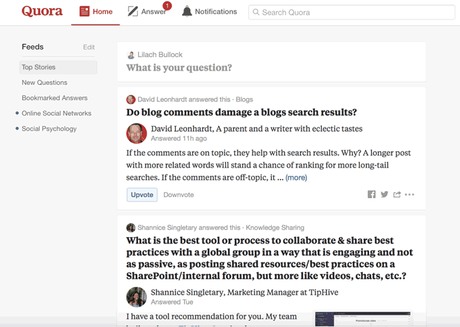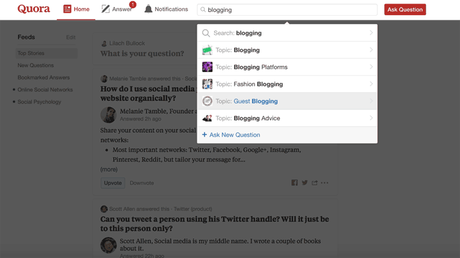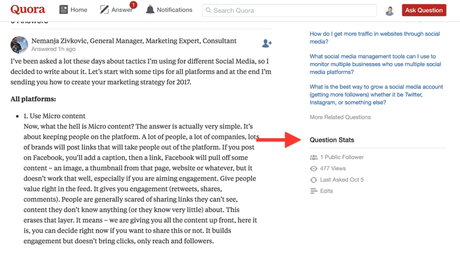I'm going to start this with a very strong statement: Quora is an amazing source of quality traffic. It's un underutilised gem when it comes to promoting blogs and websites online - which, I guess, is not a bad thing, as it keeps the platform running with quality content, instead of turning it exclusively into a platform for promoting businesses, and blogs. However, if you're providing value in your answers, that's all that matters - in this blog post, I want to talk about how you can promote your blog and website with Quora, the right way. What is Quora?
Quora is a Q&A platform (similar to Yahoo! Answers), where anyone can ask any question - about life, love, business, childhood stories, and everything in between - and anyone can answer, to the best of their ability.
All answers are then subject to the communities' preference; people can upvote and downvote, and this is how the top answers are decided. The better your answer is, the more upvotes you get and the higher up your answer will appear in the questions' feed.
Why use Quora?
Quora is a great place to demonstrate your knowledge and grow your social influence. It's a big community (Quora is in the top 120 websites in the world, according to Alexa) and the best answers can attract tens of thousands of views over time.

Quora is also great for promoting yourself and your blog or website. You only get to show and promote your knowledge, but you can also link to your blog/website, where relevant - which, in my experience, can lead to very high quality traffic. In fact, in just a few short months of using it and posting about 2 new answers a day, I've turned into one of my main sources of traffic. Even though it doesn't reach the numbers that Twitter or Facebook do, for example, Quora traffic makes it all up with its quality; it has a higher average time spent on site and a much higher conversion rate with more sign-ups to my email list - meaning, it's also a great for lead generation.
How to find good questions
The first thing to do is, of course, to find questions to answer. Look for questions that are relevant to your blog; preferably, questions that you've actually answered in one of your blog posts.
The best way to get started is to follow relevant topics, so you can relevant questions directly in your feed. Just use the search feature, enter your keywords, and you'll see a list of relevant topics to your search:

If you find any topics that are relevant and active, follow them. Alternatively, you can also use the search feature to look for questions directly.
Once you find a question to answer, scroll down to check the stats:

In this case, the question has only 1 public follower and 477 views, which doesn't make it very appealing; however, because the question was asked recently, it might be worth a shot.
Ideally, try to answer questions that were asked very recently and have no, or very few answers already. This way, you increase your chances of getting the top spot in the list - as long as your answer is also very good.
However, you should still look at older questions as well; here, you should base your decision based on the number of public followers and total views. The bigger these numbers are, the more likely it is that the question is still very relevant and people are interested in learning more.
How to answer questions on Quora
The best tip I can give is this: provide lots of value. Answer the question - truthfully. Don't beat around the bush; if someone asks for specific tips for achieving something, give them the best tips you know. Don't write fluff - write exactly what the person is asking for.
The reason why Quora has made it, while other Q&A platforms like Yahoo! Answers, didn't, is that people take it seriously and there are some amazing answers on there. People put an effort into what they write, whether it's business tips, or their biggest secrets in life that they've never mentioned anywhere else.
However, some important things to keep into account when writing on Quora, are:
- Make your answer easy to read: use bullet points, sub-headlines, highlight important parts, and so on. If your answer is one long 500-word paragraph, most people will probably avoid it. However, if it's easy to read and skim through, you're increasing your chances of getting read exponentially
- Support your answers with media: where possible, try to use screenshots and other useful imagery to enhance your answers. Just like with blog posts, it makes your answer easier to read and especially when it comes to screenshots, it also provides more value to the reader
- Use links to support your case: if you're making any big claims, or reference statistics and so on, try to always link to the source of your information - there's a reason why professors where always bugging us about referencing everything we claim in our writing! You can then also promote your blog and other content this way - simply mention the fact that you provide even more in-depth discussions about the respective subject on your blog, and link to the specific blog post.
- Be genuine: Quora is a platform for regular people. The members of this community appreciate genuine, conversational answers - not blog posts written in a rigid or promotional manner. When you're answering a question, imagine you're talking to a friend and answering one of their questions, rather than writing something that resembles a blog post more than an answer. Talk about yourself when necessary, mention your own experiences and generally, try to be human in the way you respond.
- Length of answer: there is no right answer here; some questions are very straightforward and only need a few sentences, while others can take you to 500, even 1000 words. As long as you're actually answering the question to the best of your ability, you're on the right track.
Quora Ads
One of the ways you can get some results quickly from Quora, is to use their Ads. The reason I mention them is that I recently read a test performed by the Social Media Lab that looked into the effectiveness of using Quora Ads to promote a business - and how the conversions change when you link to a blog post, versus a landing page, in your ad.
The results were quite impressive; they found that by using Quora Ads to promote a blog post, they not only got an impressive number of impressions and clicks, but they also made a 1.98% conversion rate, with 19 users getting the free trial.
The results for the landing page were even more impressive; while it got half the number of impressions and clicks than the blog post ad, it actually had a conversion rate of 6.87%, with 31 people signing up for the trial.
If there's anything these numbers show us, is that it's worth experimenting with Quora ads - especially if you, like many others, are finding yourself disappointed with the results from ads on Facebook and other top social networks.
Conclusion
Quora, if used regularly and if you're providing quality answers, can turn into one of your highest quality traffic sources. Not only that, but it can also help grow your social influence in your niche, as you become a recognized source of quality answers, tips, and advice.

